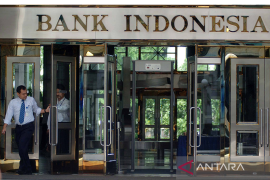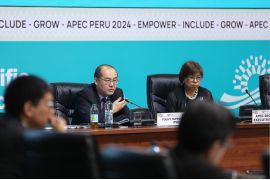"The economy is estimated to grow 6.5 percent in the first quarter of 2012 and will continue growing in the second quarter although it would be slower," the central bank spokesman, Difi A Johansyah, said quoting the conclusion of the bank`s board of governors` meeting here on Thursday.
He added that domestic demand remained strong, especially household consumption and investment, while export growth is expected to be lower in line with the global economic slowdown and the drop in the price of non-energy global commodities.
The economic development in the first and second quarter still matches the economic growth projections between 6.3 and 6.7 percent for the whole of 2012.
The weighted risks show a downward trajectory due to the impact of the global economy and the government`s planned energy policy. Efforts to stimulate the economy need to be taken, especially in the fiscal policy area, and not just in the monetary and banking sectors, Difi said.
Meanwhile, the balance of payment in the first quarter is estimated to record a smaller surplus consistent with the current account deficit in the first quarter of 2012, which is predicted to be bigger due to a decline in exports and high imports as a result of strong domestic economic activities and fuel oil consumption.
The surplus in capital and financial transactions is down due to a smaller inflow of portfolio investment.
The country`s foreign exchange reserves until the end of February 2012 were recorded at US$112.2 billion, which is equal for imports for 6.3 months and the government`s foreign debt payment.
The rupiah exchange rate meanwhile has relatively remained stable despite little pressure. In February, the currency weakened point-to-point by 0.33 percent to Rp9,020 against the US dollar but averagely strengthened 0.69 percent to Rp8,998 per US dollar.
Several factors that have added pressure on the rupiah include adjustment in the foreign investor portfolio due to global sentiment and increasing imports following domestic economic activities.
To maintain the domestic market balance, Bank Indonesia keeps monitoring the development and takes measures to stabilize the rupiah through foreign exchange markets and state bond secondary markets.
Difi said the stability of the banking system was maintained by the improvement of intermediary functions, displayed by the capital adequacy ratio (CAR) that stands far above the minimum level of 8.0 percent and gross non-performing loan (NPL) at below 5.0 percent.
Credits grew 23.7 percent year-on-year until the end of January, while investment credits grew 38.1 percent year-on-year and will hopefully increase economic capacity.
Meanwhile, he said, working capital and consumer credits grew 20.2 and 20.3 percent respectively, year-on-year.
(SYS/KR-BSR/S012)
Editor: Suryanto
Copyright © ANTARA 2012











